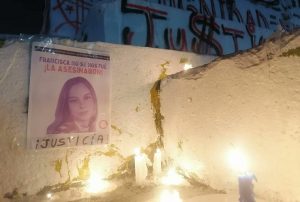The Court of Guarantee in Arica, Chile, began trial this Thursday (1) for two crimes of torture against journalists who were forced to take off their clothes at a police station.
The complaints were made by the National Institute for Human Rights (INDH) on behalf of Estefani Carrasco Rivera and Patricia Torres Basualdo, who reported being harassed after being detained while covering popular demonstrations taking place in the country in 2019.
The International Federation of Journalists (IFJ), which is following the case, said in a statement that “abuses during captivity should be declared as torture”.
Torture of journalists took three years to begin prosecution
The organization draws attention to the fact that only three years after the protests that gripped the country, the first cases regarding the violations of the security forces against the journalists covering the events began.
In a statement, the journalists explained that “while performing their duties as journalists, they were unlawfully detained by four police officers who used excessive force during detention during the first week of the national uprising.”
They reported being forced to undress at the Third Police Station in Arica, a city in the north of the country, by a person who is now a former Carabineros employee.”
Estefani Carrasco Rivera spoke to the Federation about what has happened since then:

“There has been no progress in the pursuit of justice in Chile, much less guarantee that the human rights violations that occurred during the social epidemic will not be repeated”.
“After nearly three years, it is unacceptable that our case is just one of more than 70 cases that have reached the trial stage in our city”.
For Rivera, it is a matter of showing that the practice of undressing amounts to torture given the political and social context in which it takes place”.
However, the Public Prosecutor’s Office did not understand this. The case was determined as abuse against individuals with lower legal qualifications and less punishment.
“We believe that a real measure to ensure that such incidents do not happen again is the conviction of our attacker for torture”.
The hearing mobilized the city with the demonstration in front of the courthouse and the hashtag #DesnudarEsTortura with support from social media.
Three years later, on September 1, there will be an oral hearing of our illegal detention and robbery by the commission. It is the 1st instance of the social crisis in Arica that has reached this stage.@CNNNChile @24HorasTVN @ChilePeriodista @Aricaperiodista #UndressTorture pic.twitter.com/0WFwI8sZ6F
– Estefani Carrasco (@esteficarrasco) 30 August 2022
According to INDH data, there are more than three thousand nationally registered complaints about acts of torture, rape, injury, vision loss, fracture and even murder in Chile, corresponding to the period from October 2019 to March 2020.
The agency counts 516 acts of sexual violence during the protests and 360 incidents similar to those of Rivera and Bausaldo.
The International Federation of Journalists stressed the importance of recognizing “all human rights violations committed against them and the consequent damage to freedom of expression by these attacks”.
“Press professionals have the right to conduct their business safely and free from all forms of violence”.
It is essential for the IFJ that the case establishes case-law that protects women journalists who have been subjected to violence twice because of their work and their status as women in a patriarchal system.
Also Read | UNESCO: What newsrooms and Big Technologies need to do to reduce online violence against women journalists
The IFJ recalls that attacks similar to those against journalists are classified as torture in international agreements signed by Chile.
They form the basis of the country’s legal provisions on torture.
Article 150 A of the Penal Code defines crime as “an act of deliberately inflicting physical, sexual or psychological pain or serious suffering on a person in order to obtain information, statements or confessions from himself or a third party, to punish him”. for an act alleged to have committed or committed, or for the purpose of intimidating or coercing that person, or because of discrimination based on grounds such as the victim’s ideology, political opinion, religion or beliefs (…)”.
Also Read | Reporter shot dead during protest sparks riots and street riots in Chile
source: Noticias

